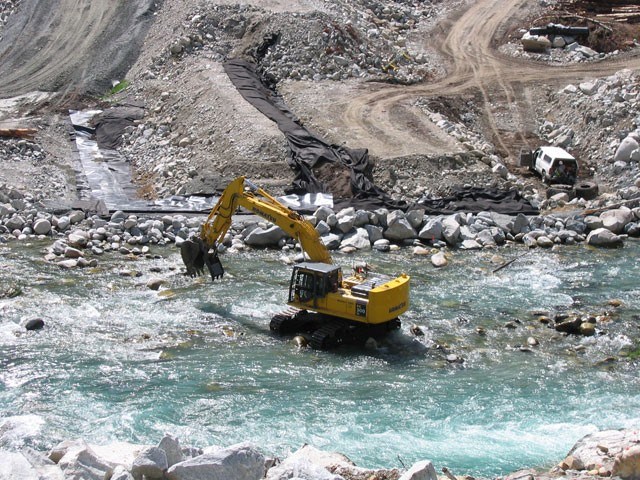What: 49 Megawatts, Vancouver International Mountain Film Festival
Where: MY Millennium Place
When: Friday, March 28, 7:30 p.m.
Tickets: $15 adults; $12 youth
The 11 th annual Vancouver International Mountain Film Festival (VIMFF) is coming to town — in a 1984 converted diesel Mercedes, affectionately dubbed George Oilwell.
Ivan Hughes, tour coordinator, explains that they are taking a more hands-on and environmentally friendly approach to screening their films across British Columbia and Alberta. The vehicle runs on post-consumer vegetable oil.
“We wanted to take the films out to the communities ourselves and thought that if we’re going to do that and drive it all over B.C. and Alberta, that we wanted to do it in the most environmentally conscious way as possible, and this seemed to be the best way to do it,” Hughes explained. “It’s not the answer, but it’s a better way to do it, anyway.”
This is also the first year organizers have incorporated environmental topics into the festival, introducing an entirely new part of the festival called the Earth Alliance Series, sponsored in part by the David Suzuki Foundation.
Hughes says climate change is having an impact on anyone involved in outdoor adventure sports, adding that he knows a few mountaineers who have photos of glaciers from 10 to 20 years ago, who have returned recently to find incredible recession.
“It’s just impacting us more and more every day, and I think the people that are out there doing adventure sports are seeing it first-hand,” said Hughes.
The film, 49 Megawatts , produced by Bryan Smith, captured the prize for Best Environmental Film at this year’s festival. The film follows the story of the independent power project on Squamish’s Ashlu River.
“The story is a little bit old, but it’s certainly relevant with everything that’s firing up right now,” Smith said, pointing to the recent controversy over a similar power project along the Upper Pitt River.
From Chile to China, Smith agrees that adventure sports enthusiasts are starting to pay attention to environmental issues that are hitting close to home, and says a lot of the world’s top kayakers are seeing the first-hand effects of global warming and over-consumption.
A professional kayaker and adventure filmmaker, Smith lives in Squamish and spends a lot of his time on the water, running the camera and paddling.
Smith and his loose knit group of fellow paddlers, photographers and filmmakers started off as amateurs, simply wanting to document their trips.
“Then as the kayaking trips started to get grander and grander, the filming of those missions and trips became more important,” said Smith.
They recently released another film, Pacific Horizons , which is more of a travelogue and adventure film that showcases several sea kayaking locations in Oregon, Washington and British Columbia, and the personalities of people who participate in the sport.
While 49 Megawatts isn’t really about kayaking, their passion for the sport inspired Smith and his crew to document the progress of the IPP on the Ashlu.
“We just couldn’t believe what was happening up there, so it was like, ‘well, why don’t we film it? Why don’t we film what’s going down and just put the visual out there to people.’”
They made the film in a short amount of time, and on a very small budget, and put the finished product up on the web so everyone could watch it for free.
Smith says they tried to present both sides of the IPP argument in their film, but it was hard to get the proponents of the project to discuss the controversial project outside of formal, sanctioned public hearings.
“We didn’t want to make a film that was really bashing the other side and was really polarized,” Smith said, adding that they simply wanted to show people how valuable the province’s river systems are, and outline their concerns surrounding the IPP process.
So they ended up talking to politicians, including Squamish Mayor Ian Sutherland and Whistler Mayor Ken Melamed, about the political process behind the Ashlu project. MLA Shane Simpson, the NDP environmental critic is also featured. They also spoke with a local private power advocate, and a number of fishing guides and residents.
The end result was a 30-minute film that simultaneously showcases the beauty of the Ashlu River, with ziplined shots of isolated gorges. The film points to the lack of meaningful, public participation in the planning process, asking that the public consider reducing energy consumption, rather than hinging our hopes on a multitude of private power projects.
They first screened the film at an AWARE meeting in Whistler last spring, shortly after they completed the film, which generated a lot of interesting debate and discussion.
While the film focuses on the specific story of the Ashlu River, Smith says it illustrates the impacts of IPPs throughout the province.
It’s also gaining momentum as the issue of IPPs is finally coming to the public eye.
“A year ago, when we made the film, it was still… a fairly small percentage of people that really knew what was going on,” said Smith. Now, the issue is definitely becoming more mainstream, with more members of the public taking a stance on the issue.
“The groups and the people that are showing up and fighting this now are not just local residents in the Sea to Sky corridor and a few kayakers and whatnot. It’s definitely a broader coalition of people now.”
Smith is pleased that the VIMFF is placing an emphasis on local environmental issues, and is excited to screen 49 Megawatts in the Sea to Sky corridor again.
“Even through the Ashlu is sort of behind us, and we need to be looking towards the future of the rivers… it’s just getting more and more people paying attention.”
He hopes the film continues to encourage debate. Smith will be on-hand at Friday night’s screening to offer some insight into the films and answer questions.




